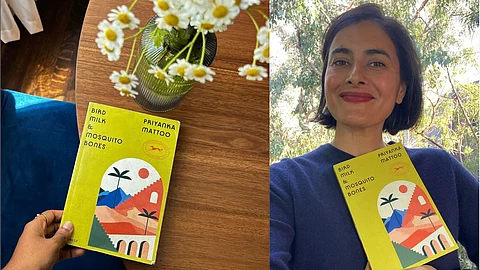
- HOMEGROWN WORLD
- #HGCREATORS
- #HGEXPLORE
- #HGVOICES
- #HGSHOP
- CAREERS
- ABOUT US
- CONTACT US

There's a familiar guilt that settles in when we're oblivious to major events unfolding in our own backyard. We tell ourselves, "There's just so much going on, I'll get around to learning more later." But what if understanding these issues wasn't just about staying informed, but about forging a connection with a life uprooted by them? Priyanka Mattoo's 'Bird Milk & Mosquito Bones' offers such a chance. It's a profound and witty exploration of displacement, identity, and the resilience of the human spirit.
Few voices manage to strike a balance between profound introspection and lighthearted wit as deftly as Priyanka Mattoo does in her debut book. This collection of essays takes readers on an odyssey spanning continents and cultures, chronicling Mattoo's relentless quest for home and identity amidst the tumultuous setting of Kashmir's political upheaval.
The book's title itself is a whimsical precursor to the eclectic narrative that lies within. 'Bird Milk & Mosquito Bones' is created from the threads of Mattoo's transient life, stretching from the idyllic valleys of Kashmir to the streets of Los Angeles. Her journey begins in the late 1980s, when escalating violence in Kashmir forces her family to flee their ancestral home. The pain of leaving behind a place deeply ingrained in their identity is a recurring motif throughout the essays.
Mattoo’s writing is imbued with a rare combination of humor and pathos; capturing the essence of displacement with an unflinching honesty. She recounts her childhood in Saudi Arabia, where friendships were formed and dissolved behind the high walls of expatriate compounds, and looks back on her attempts to recreate her mother’s rogan josh recipe via Zoom, a culinary endeavor that doubles as a metaphor for her efforts to preserve cultural roots in foreign soil.
One of the book's most compelling aspects is its exploration of the concept of home. For Mattoo, home is not confined to a physical location but is rather a mosaic of memories, relationships, and cultural touchstones. Her peripatetic existence, which saw her accumulate thirty-two different addresses over forty years, illustrates the fluidity of this concept. We get a moment to reflect on our own definitions of home and belonging and begin to see these notions as dynamic rather than static.
She captures the idiosyncrasies of each place she inhabits, from Rome to Michigan, with a vividness that transports readers right to these places. Her ability to find humor in the most unexpected situations, such as navigating cultural misunderstandings or adapting to new environments, adds a welcome levity to the narrative.
The essays also delve into Mattoo's personal relationships; offering us an intimate and vulnerable glimpse of her life. The challenges of raising a family in a foreign land and the moments of connection and disconnection with her parents and siblings are recounted with a candor that will resonate deeply with anyone who's ever yearned for a place they can truly call their own.
Ultimately, Mattoo’s essays offer a rich, multifaceted portrait of a life that is in perpetual motion but remains grounded by a deep sense of self and heritage.
If you enjoyed reading this, here's more from Homegrown:
The Roots Of A Revolution: Tipriti Kharbangar On Her Khasi Identity, Going Solo, & More
Folk Rockers Gaekhir Republik's New Album Captures The Grief & Hope Of Kashmir
